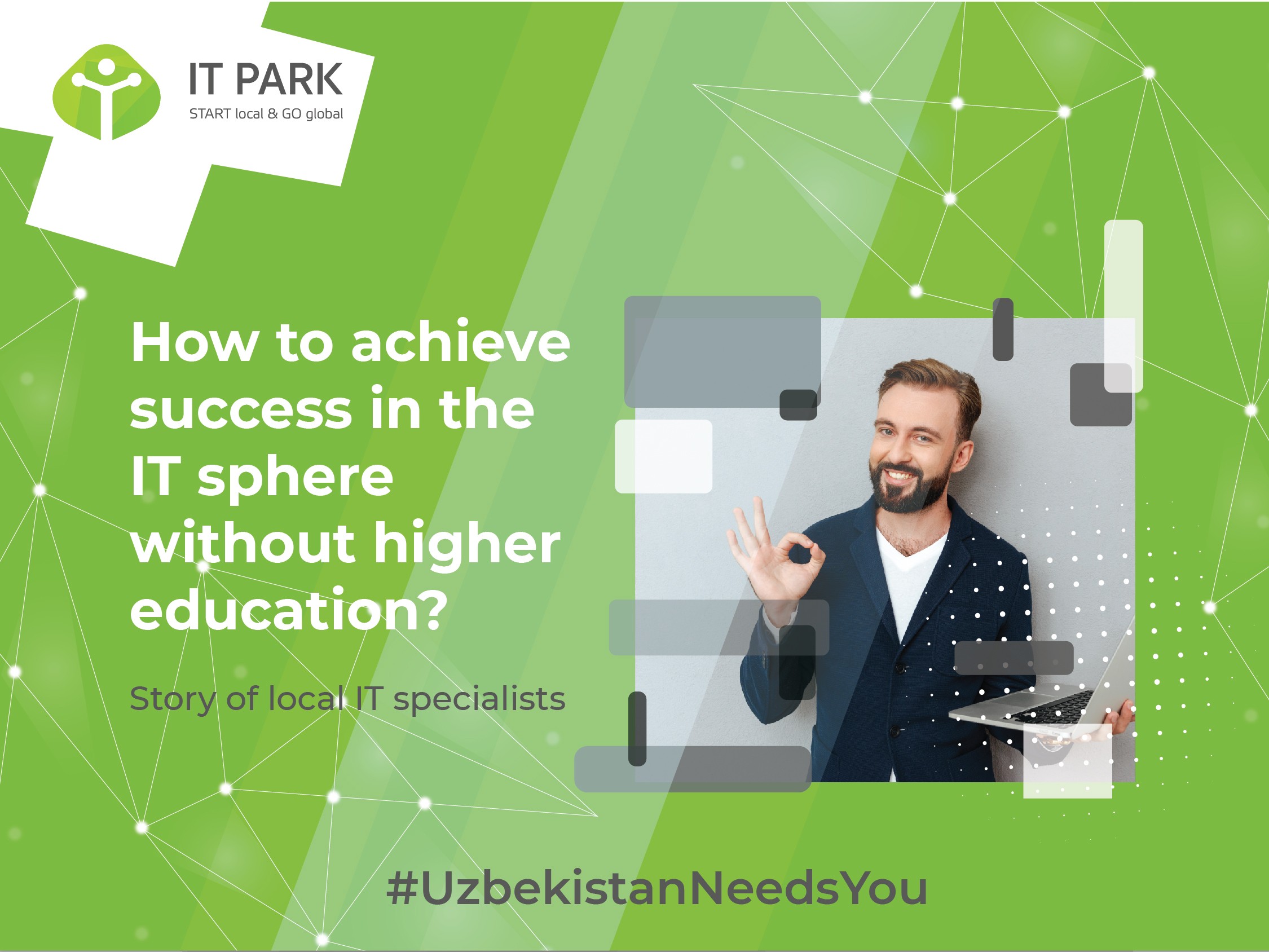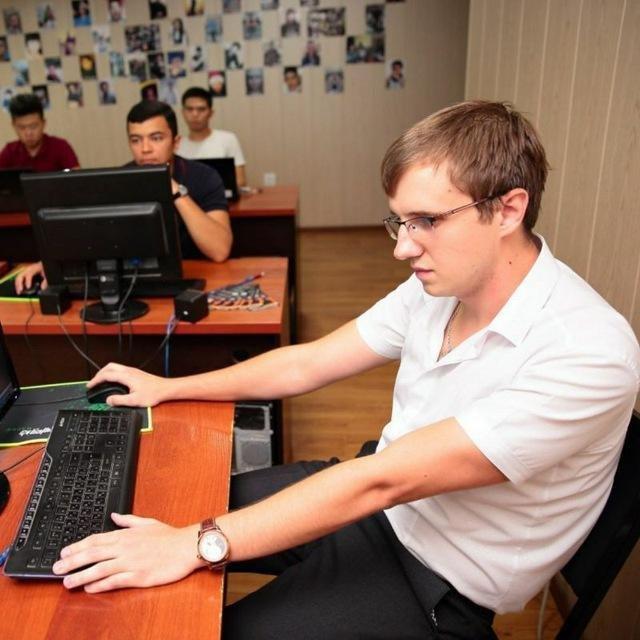
How to achieve success without higher education: Stories of local IT specialists
IT Park conducted a series of interviews with Uzbek IT specialists who were able to achieve success in the field of information technology without having a higher education diploma.
Spending 10-15 minutes of your time reading the article, you will understand that it is not so difficult to find a common language with IT, and you can also use it to earn good money and a diploma does nor requre for this!
The first expert that we interviewed is Nazima Khalilova. Nazima is 33 years old and has been working in the IT industry not for a year. Now she is a freelancer. Her earnings per month, on average, is $700.

- How did you end up in the IT field?
- When I was about 14-15 years old and the Internet was still on antediluvian screeching modems, I came across the program ‘Dreamweaver’. That's when I started trying to do something. It was pathetic, of course, I still tried to do flash animation, and then I got sick of it all. But, life ordered differently. I dropped out periodically and returned to the IT sphere, and each time I had to either study or live. Since my parents did not wake up very early and I provided for myself on my own. After writing a few lines I liked that, and everything came to life, as if you were giving birth to a child.
- Where did you learn programming?
- Mostly I studied by myself, by trial and error, then YouTube appeared, I read books, watched and tried. Then I got a job on an internship, somewhere friends suggested, somewhere I broke my head for a long time. But mostly to everything I came by myself.
- Did the lack of a higher education diploma reflect for looking a job in the IT field?
- I do not think so. I like writing codes, solving problems, and wherever I worked or did an internship, I didn't need a high school diploma. Perhaps the diploma is more necessary for those who want to take a senior position in the governmental sectors, I don't want to work there. By the way, my knowledge was not always rich; leaders saw the potential and took on the job without any paperwork.
- Why did you decide not to attend to university?
- As I said above, I left alone early, in my 16s, and I had to provide for myself, so what kind of study? When you have to think about what to eat tomorrow, what to wear, etc. I had to work, I didn't have anyone.
- Do you still plan to attend to university?
- No, it's a waste of time. I think it's stupid to look at having a diploma. Having a higher education is not an indicator of intelligence.
- In what are you specializing now?
- Now I'm working on Wordpress, learning to write plugins and themes, and in my spare time I'm developing apps for iOS, just for myself, so as not to lose the experience. IT is a thing where you must always be on the move. I plan to switch to development later, but now I'm still studying, because developers receive large orders and amounts, for example, there are guys who earn from $3000 for the position of developer.
- Do you think that having a higher education diploma is necessary for the field in which you work?
- No, roughly speaking, it is not necessary at all. It's all about the head and knowledge, I believe that universities do not give much; you only need practice and desire.
- If you had a chance to go back to the past and change your field of activity, would you change it?
- No, on the contrary, I would try to spend more time learning programming; because I spent a lot of time in vain, trying to earn money, and not to do what I love. So I would devote more time to coding.
The next specialist that we talked to is Viktor Abramov. Viktor is 27 years old. His path to the world of IT is very long and he has never regretted that he chose this path. Now Viktor works for iTV and does not complain about his earnings. He works as a Frontend developer.

- How did you end up in the IT field?
- Since high school, I've loved computer science classes. I remember well how we passed, and for me everything seemed like some kind of magic. Then, during school years (it was about 2007-2008), my classmates and I played games of the MMORPG genre, and around these games were always mentioned some servers, builds, and usually they were linked to some site with registration, statistics, and other ‘utilities’. For me, it was all ‘wild forest’ and I really wanted to find out how it all turns inside.
Once such an ‘assembly’ fell into my hands. In essence, ‘assembly’ is a server application written in Java. The package included instructions on installing this app, how to link the database and launch the site. Naturally, it was not easy for me, but I still started it. I was very interested in digging into the files of the ‘assembly’, to learn what it consists of. However, I also did not forget to experiment with the site that was included in the package. There I practiced all the things that we went through in school in computer science classes. Then I found out that in addition to HTML, the site has another language - CSS. When I first saw CSS, I thought, this is programming. It was a huge number of codes and absolutely incomprehensible syntax for me. Later, I began to understand that HTML and CSS are closely related and, in fact, CSS is the language for describing the site's appearance.
However, all those remained within the framework of my hobby, which I successfully abandoned when I entered college in 2009. Unfortunately, I studied not as a programmer, but as a mechanical technician, and after graduating from college, I started working like many of my friends. And around 2012, I got a job at a pharmaceutical company. There I was lucky enough to meet a man named Dima. Dima has been working for this company for a couple of years, but the most interesting thing is that he was also interested in web programming. Dima taught me the basics of table layout and showed me the newfangled CSS3 of that time. Dima and I decided to change our occupation, but unfortunately, there were very few vacancies in Tashkent, and we were mostly looking for guys with experience. I had already given up programming (if I can call it so) for the second time.
- Where did you learn programming?
- From 2014, I set a goal to change my profession and become a programmer. Naturally, the first question I asked myself was: where is this taught? I knew exactly what I wanted to do, so I started looking for training centers that taught web programming.
In 2014, there was a large shortage of such institutions in Tashkent. I found three training centers; they were Micros, BePro, and Proweb. I chose Micros from them, it was closer to work. In Micros, I refreshed my old knowledge and learned the basics of ‘block’ layout, but this was not enough. Then the teacher recommended me some informative YouTube channels and advised to enroll in the second course at Micros, the CSS library Bootstrap and The JavaScript programming language, which included important topics at that time. Actually, I did so and signed up for the second course. But there was a small problem that the course did not start until enough people were recruited for it, so I had to wait. In order not to lose my skills, I started learning on my own using videos from the YouTube channels that my teacher recommended. From there, I got to know a little bit about the Bootstrap and jQuery libraries, and learned a little about the CMS WordPress.
About 2-3 months have passed since I signed up, and I had not been invited to Micros. I went looking for a training center again, and this time I looked at Proweb. In Proweb, I was interested in a comprehensive training program for 9 months. The program covered most of the required knowledge in this area at that time. When I signed up for Proweb, I joined in Sarwar's group.
Sarwar was a good mentor, and his lessons were very informative. The lessons were fun and interesting, and 9 months flew by unnoticed. The skills I gained over these 9 months were enough to start a career in IT. Of course, this was only the beginning of my studies, because in the field of IT you have to constantly learn something new.
- Did the lack of a higher education diploma affect for looking a job in the IT field?
- I was lucky with my very first job. After completing a nine-month course at Proweb, the Director of that educational institution, George, offered me a job as a teacher. It was unexpected offer for me, I had never taught and I had no idea what it was like. I consulted with my mentor, Sarwar, for a long time and came to the conclusion that it was a great chance to get into the IT sphere. In the future, the question of higher education was not raised during interviews with other companies.
- Why did you decide not to attend to university?
- I had not a financial opportunity to go to university at that time and I had to go to work.
Тогда не было финансовой возможности поступить в ВУЗ и мне пришлось пойти работать.
- Do you still plan to attend to university?
- I have thought about it, but I do not have the motivation to attend to university yet. For many, higher education is ‘propping up the table leg’ (the diploma is lying idle). There must be a good reason for me to spend 4 years of my life at a university.
- In what are you specializing now?
- I specialize in developing web applications, mainly on the React framework (library). The last major project was an application for Samsung and LG smart TVs.
- Do you think that having a higher education diploma is necessary for the field in which you work?
- In my experience, Frontend development, the field in which I work, is developing very dynamically and few people are interested in your diploma during the interview, everyone wants to know what projects you have under your belt, whether you know the new development standards, in general, the employer is interested in your experience.
- If you had a chance to go back to the past and change your field of activity, would you change it?
- As I mentioned above, initially I did not work in the IT field. If I had a chance to go back to the past and start my career in IT much earlier, I would not have done it, because a lot of things would not have happened, and I would not have met the wonderful people I know.
Igor Ryzhov is the name of a man who reached from the level of ‘self-taught’ to the level where his income is about 1.5-2 thousand US dollars a month. At his 22, he is ‘the Lead of Frontend’ in the company Express 24.
_1597038213_1597049147.jpg)
- How did you end up in the IT field?
- I was interested in creating something that people will use. What solves some problems automates routine tasks.
- Where did you learn programming?
- I am self-taught, like most developers. I became interested in development at school during computer science classes, in HTML and CSS lessons. I downloaded ready-made templates on the Internet, studied how they work, and adjusted them to fit me. After a while, there was another, more interesting activity — an online game GTA SA: MP.
I found a lot of friends there; we always sat in TeamSpeak and talked about different topics. During the next meeting, the idea of creating a project related to online games arose, and everyone lit up with that idea, including me.
We started discussing what we want to launch. At that time, all such projects had a forum, and we decided that we also needed it. There were no programmers among us, so we used ready-made solutions. I had to adapt the standard forum code to our theme, and decided to remember HTML/CSS.
However, we closed the project soon, and I don't remember the reasons. I decided not to give up studying development and find other projects, so tasx.uz was appeared so.
In 3 months with basic knowledge, I was able to create and launch an online movie theater. For the next 2-3 years, I worked only on this site, improving it in every possible way, optimizing existing solutions. After I graduated from college I had to decide whether to study or work. I chose the latter because one of my friends offered me an interview right after I graduated from college, and I agreed. That's how I got my first official job. I got a lot of experience and knowledge there. About a year and a half later, I changed my job. I was recommended to the guys from Express 24 and I was invited to an interview. I've been working here for three years. I continue to improve my skills and try myself at management.
- Did the lack of a higher education diploma reflect for looking a job in the IT field?
- When I working as a programmer, I was asked a higher education once, when I was interviewed by Aviasales. HSE is required for obtaining a work visa (Aviasales office is located in Phuket). But if you have enough official work experience, you can work without higher education.
- Why did you decide not to attend to university?
- When I was at college, I started developing my own projects that brought money: online cinemas, game servers, freelancing, and so on. After graduation, I was immediately hired for a good job, the presence of a higher education diploma was not required anywhere.
I have seen people spend 5 years of their life hoping for a successful career after university, but in the end they cannot find a job. This motivated me, and I decided to develop on my own.
As it says, it's never too late to study, you can always get a diploma.
- Do you still plan to go to university?
Someday maybe. Sometimes, I feel the need for knowledge of mathematics and geometry, I would like to solve it.
- In what are you specializing now?
- I manage the development of the client part of the services, automate the routine, and monitor technical documentation. Under my leadership, there are three small teams: web, android, and ios.
- Do you think that having a higher education diploma is necessary for the field in which you work?
- Subjectively, I think that I do not need it. Higher education does not give any ‘ticks’. Now all information is available on the Internet, according to desires you can find and study topics of interest.
- If you had a chance to go back to the past and change your field of activity, would you change it?
- No, I never thought of that. I may not always be a developer, but I will always be in IT. I try my best to attract people to the sphere and help them ‘enroll’. I have a developer in my team who I personally motivated to learn programming. He got the basic knowledge in the course, and then I invited him to join my team.
So, if you want, you can get knowledge in about a year and get a good job, where you will be pumped even more. My hobby has become a job and I like it.
Our next expert is Maxim Stafeev, who is in the field of IT since 2015. He works at IT Park as a chief developer. Regarding his earnings, Maxim said the following, ‘Earnings in the IT sphere at the moment, and in the future, are and will be very good. It is enough to support a family, raise a child, save for large purchases, and pamper for family and yourself."

- How did you end up in the IT field?
- Even at a very young age, there was a period when I was interested in online games. I created a website for our clan on the constructor. So did the website for football club fans, all this was without code, but just dragging and dropping elements with the mouse. When I opened the code, I thought that it was something terrible and incomprehensible, and I did not go into it, gave it up and took up music. After I failed to enter the Institute, I got a job at a factory. At first I liked it very much, but then realizing that there are no prospects, I decided to radically change my life and seriously start programming.
- Where did you learn programming?
- After I decided to study programming, I started reading various books and watching videos on the Internet. However, this was not enough, and in any case I needed an experienced mentor, so I went to the training center to consolidate my knowledge. I learned their program very quickly, and it gave a huge boost to my career. I also took various paid courses on the Internet, but I was already getting advanced knowledge there. At that time, there were very few good video courses on programming. Now things are much better with this, and you can find a lot of useful information on the Internet.
- Did the lack of a higher education diploma reflect for looking a job in the IT field?
- When interviewing in the companies where I worked, the diploma was not asked, they looked only at the experience and projects that I did. There was one company where I was required to have a diploma, but even without it I was taken there, but only without the opportunity to grow in position.
- Why did you decide not to attend to university?
- I did. I didn't manage to enroll in the first year, in the second, it didn't work out because of finances, and I didn't want to strain my parents to pay for the contract for 4-5 years.
- Do you still plan to go to university?
- No, I don't plan to, because everything is going great.
- In what are you specializing now?
- Mostly in Backend development, but I also encounter Frontend.
- Do you think that having a higher education diploma is necessary for the field in which you work?
- I think not, except that in some state institutions you may require a diploma, but they can take you without it. Basically, they only look at skills and experience.
- If you had a chance to go back to the past and change your field of activity, would you change it?
- Of course, such thoughts occur to me, but I like the way my life turned out, exactly at the time when it all happened. So I wouldn't change anything.
These were small success stories of people who, in their time, despite everything, made the choice that turned out to be the most correct and right for them. Their lives could have turned out quite different, if they had chosen a different path.
All these people are real samples of the fact that no matter what you have to go through, whether you have graduated from a university or not, you always have the opportunity to try yourself in IT and start earning, those who have a higher education as well.
And we are in no way opposed to higher education, because we believe that higher education provides a lot of advantages. What is only networking or student life itself that every student goes through? On the contrary, you should always seize opportunities, search, try, and take risks.
But if suddenly university does not work, it is not the end of life. Exactly that period of your life (if you do not attend to university) can be your starting point in the huge and exciting world of IT, which will give you not the worst networking, a huge amount of knowledge and, of course, a decent profit.
Samples of people we interviewed are not many in our country. But we hope that in the near future there will be more and more like them. After all, IT Park creates all the conditions and works hard to achieve for this purpose.
There is always a choice, there is always a risk, and there is always an alternative. And in your case, an alternative to higher education can be the IT sphere.
2020-08-10